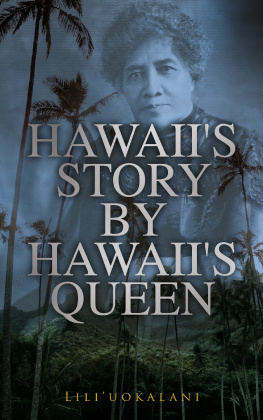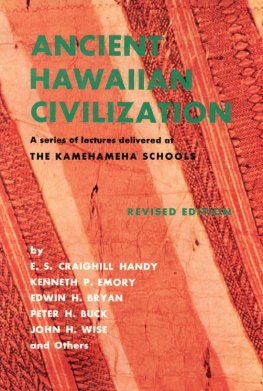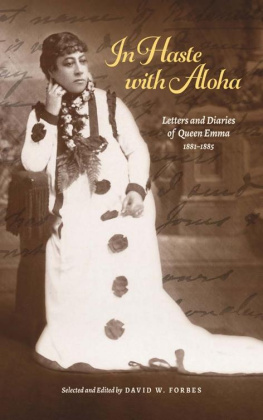Chapter I.
A Sketch of My Childhood
THE extinct crater or mountain which forms the background to the city of Honolulu is known as the Punch-Bowl; at its base is situated the Queen's Hospital, so named because of the great interest taken in its erection by Emma, the queen of Kamehameha IV. Funds for the cause were solicited by the reigning sovereigns in person, and the hospital building was completed in 1860. Very near to its site, on Sept. 2, 1838, I was born. My father's name was Kapaakea, and my mother was Keohokalole; the latter was one of the fifteen counsellors of the king, Kamehameha III., who in 1840 gave the first written constitution to the Hawaiian people. My great-grandfather, Keawe-a-Heulu, the founder of the dynasty of the Kamehamehas, the Keoua, father of Kamehameha I., were own cousins (he was also brother of Mrs. Bishop's ancestress, Hakau), and my great-grandaunt was the celebrated Queen Kapiolani, one of the first converts to Christianity. She plucked the sacred berries from the borders of the volcano, descended to the boiling lava, and there, while singing Christian hymns, threw them into the lake of fire. This was the act which broke forever the power of Pele, the fire-goddess, over the hearts of her people. Those interested in genealogies are referred to the tables at the close of this volume, which show the descent of our family from the highest chiefs of ancient days. It has often happened in the history of nations that the most eminent men have won the crown, and then, instead of ascending the throne, have placed the executive office in the hands of another. Kamehameha I. was, indeed, the founder of Hawaiian unity, and worthy of the surname of the Great; but it is truthfully recorded in the early histories of the Islands, those written by such men as Mr. Pogue, Mr. Dibble, and others, that he owed his selection for the monarchy to the chiefs from whom the latest reigning family, my own, is descended. This indebtedness was fully recognized during the life of that monarch.
Naihe, the husband of Kapiolani, was the great orator of the king's reign; his father, Keawe-a-Heulu, was chief counsellor to Kamehameha I.; while had it not been for the aid of the two chiefs, Keeaumoku and Kameeiamoku, cousins of the chief counsellor, the Hawaiian Islands must have remained for a long time, if not until this day, in a state of anarchy. My grandfather, Aikanaka, had charge of the guns of the fort on Punch-Bowl Hill, which had been brought from the larger island of Hawaii; as the chiefs, their families, and followers had settled here from the time of the final battle, when all the forces contending against Kamehameha I. were driven over the Pali.
For the purpose of enhancing the value of their own mission, it has been at times asserted by foreigners that the abundance of the chief was procured by the poverty of his followers. To any person at all familiar, either by experience or from trustworthy tradition, with the daily life of the Hawaiian people fifty years also, nothing could be more incorrect than such assumption. The chief whose retainers were in any poverty or want would have felt, not only their sufferings, but, further, his own disgrace. As was then customary with the Hawaiian chiefs, my father was surrounded by hundreds of his own people, all of whom looked to him, and never in vain, for sustenance. He lived in a large grass house surrounded by smaller ones, which were the homes of those the most closely connected with his service. There was food enough and to spare for every one. And this was equally true of all his people, however distant from his personal care. For the chief always appointed some man of ability as his agent or overseer. This officer apportioned the lands to each Hawaiian, and on these allotments were raised the taro, the potatoes, the pigs, and the chickens which constituted the living of the family; even the forests, which furnished the material from which was made the tapa cloth, were apportioned to the women in like manner. It is true that no one of the common people could mortgage or sell his land, but the wisdom of this limitation is abundantly proved by the homeless condition of the Hawaiians at the present day. Rent, eviction of tenants, as understood in other lands, were unknown; but each retainer of any chief contributed in the productions of his holding to the support of the chief's table.
But I was destined to grow up away from the house of my parents. Immediately after my birth I was wrapped in the finest soft tapa cloth, and taken to the house of another chief, by whom I was adopted. Konia, my foster-mother, was a granddaughter of Kamehameha I., and was married to Paki, also a high chief; their only daughter, Bernice Pauahi, afterwards Mrs. Charles R. Bishop, was therefore my foster-sister. In speaking of our relationship, I have adopted the term customarily used in the English language, but there was no such modification recognized in my native land. I knew no other father or mother than my foster-parents, no other sister than Bernice. I used to climb up on the knees of Paki, put my arms around his neck, kiss him, and he caressed me as a father would his child; while on the contrary, when I met my own parents, it was with perhaps more of interest, yet always with the demeanor I would have shown to any strangers who noticed me. My own father and mother had other children, ten in all, the most of them being adopted into other chiefs' families; and although I knew that these were my own brothers and sisters, yet we met throughout my younger life as though we had not known our common parentage. This was, and indeed is, in accordance with Hawaiian customs. It is not easy to explain its origin to those alien to our national life, but it seems perfectly natural to us. As intelligible a reason as can be given is that this alliance by adoption cemented the ties of friendship between the chiefs. It spread to the common people, and it has doubtless fostered a community of interest and harmony.
At the age of four years I was sent to what was then known as the Royal School, because its pupils were exclusively persons whose claims to the throne were acknowledged. It was founded and conducted by Mr. Amos S. Cooke, who was assisted by his wife. It was a boarding-school, the pupils being allowed to return to their homes during vacation time, as well as for an occasional Sunday during the term. The family life was made agreeable to us, and our instructors were especially particular to teach us the proper use of the English language; but when I recall the instances in which we were sent hungry to bed, it seems to me that they failed to remember that we were growing children. A thick slice of bread covered with molasses was usually the sole article of our supper, and we were sometimes ingenious, if not over honest, in our search for food: if we could beg something of the cook it was the easier way; but if not, anything eatable left within our reach was surely confiscated. As a last resort, we were not above searching the gardens for any esculent root or leaf, which (having inherited the art of igniting a fire from the friction of sticks), we could cook and consume without the knowledge of our preceptors.
I can remember now my emotions on entering this the first school I ever attended. I can recall that I was carried there on the shoulders of a tall, stout, very large woman, whose name was Kaikai (she was the sister of Governor Kanoa, and they were of a family of chiefs of inferior rank, living under the control and direction of the higher chiefs). As she put me down at the entrance of the schoolhouse, I shrank from its doors, with that immediate and strange dread of the unknown so common to childhood. Crying bitterly, I turned to my faithful attendant, clasping her with my arms and clinging closely to her neck. She tenderly expostulated with me; and as the children, moved by curiosity to meet the new-comer, crowded about me, I was soon attracted by their friendly faces, and was induced to go into the old courtyard with them. Then my fears began to vanish, and comforted and consoled, I soon found myself at home amongst my playmates.







